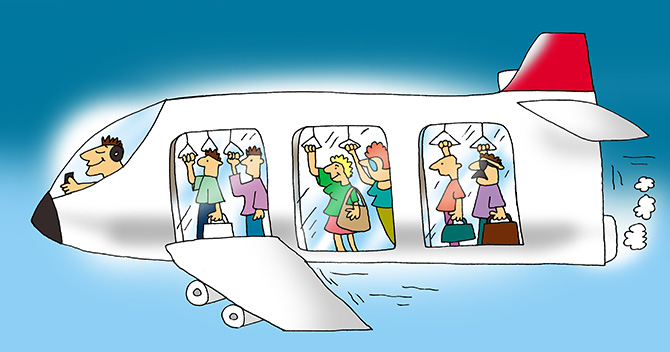A loss of revenue from liquor sales will have to be compensated through increased landing and parking charges on airlines, which, in turn, will pass on the cost to flyers.

A commerce ministry proposal to allow passengers to buy just one liquor bottle (instead of two at present) at airport duty-free shops will hurt the profits of airports and increase the cost of air travel.
The Airports Authority of India (AAI), which is state-owned, and private airport operators are likely to petition the government, saying that a loss of revenue from liquor sales will have to be compensated through increased landing and parking charges on airlines, which, in turn, will pass on the cost to flyers.
Airport charges are determined taking into account all aeronautical costs like those of landing and parking and non-aeronautical activities like duty-free sales and those of restaurants.
As airport operators cross-subsidise landing and parking charges of airlines through non-aero sales, increase in non-aero revenues leads to lesser charges for airlines, which, in turn, are expected to transfer the benefits to passengers.
“Any increase in landing and parking charges for airlines could result in higher airfares and make air travel more expensive,” added Satyan Nair, secretary-general of the Association of Private Airport Operators (APAO), a lobby group of private airport operators.
Consolidated annual duty-free sales at airports in the country are estimated to be around $500 million.
Delhi and Hyderabad airports earn 30 per cent and 15 per cent of non-aeronautical revenue from retail and duty-free sales.
In its Budget recommendation to the government, the APAO suggested the duty-free allowance of liquor be raised from two bottles to four for purchase at Indian airports because this would help reduce costs for passengers and lead to an enhanced revenue share for the AAI.
The commerce ministry has recommended restricting the purchase of tax-free alcohol to one bottle at duty-free shops as part of steps to reduce imports of non-essential goods.
“It’s not a question of large or small (quantities). As a nation, we are not encouraging the import of alcohol,” Commerce Minister Piyush Goyal told the media.
Senior AAI officials said that the move, if implemented, would lead to a loss of revenue for the AAI, which is already bearing the cost of the government’s regional connectivity scheme.
“We will oppose the move through the ministry of civil aviation. The AAI had suggested increasing the quota of liquor at duty-free counters,” said a senior AAI official.
The official pointed out if private airport operators’ revenues were affected, the AAI’s revenues too would be hurt because those airports did revenue sharing based on their annual revenues and profit.
“Who is gaining from this decision? No one. The government and airports - all will lose revenue,” the official said.
“It will be a big blow to duty-free companies and airports.
"Duty-free sales are an important component of non-aeronautical revenues for airports and 30 per cent of the non-aero revenue is used to cross-subsidise aeronautical charges,” said the chief executive officer of a private airport.
Operators of duty-free shops said it might lead to job cuts.
“Duty-free companies would have no option but to cut jobs and investments to survive,” said Manishi Sanwal, former chief executive of Flemingo Travel Retail, which runs duty-free stores at 12 airports in India.
This can also have an impact on upcoming investments in airports.
Recently Adani Airports won six airports and Zurich Airport won the bid to develop new airport at Jewar.
The groups bid aggressively, taking into consideration that non-aero revenue would help them to become viable faster.
Adani Airports didn’t respond to a query.
“Bidders have bid aggressively for new airport projects, factoring in a certain contribution from non-aeronautical revenue.
"If liquor allowance is reduced, it will impact their income and the companies will have to rework their revenue and investment models,” said Sidharath Kapur, former chief executive officer at Adani Airports.












 © 2025
© 2025